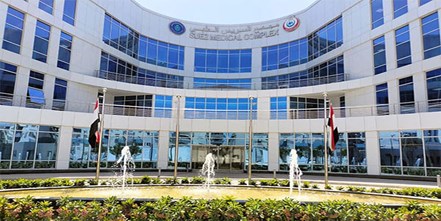



The Egypt Healthcare Authority has unveiled details of the largest medical complex in Northern Egypt, designed to provide world-class services to beneficiaries of the universal health insurance in Suez.
The Egypt Healthcare Authority reported that the Suez Medical Complex has delivered over 180,000 medical and therapeutic services within just two months of its operation.
The Suez Medical Complex accommodates 500 patients daily, with 1,700 advanced surgical interventions and medical examinations being conducted within the Suez area for the first time under the umbrella of universal health insurance.
The Egypt Healthcare Authority highlighted that the Suez Medical Complex serves the city of Badr and the New Administrative Capital, enhancing comprehensive development in Egypt.
The Chief of the Egypt Healthcare Authority described the Suez Medical Complex as a global medical edifice based on comprehensive quality concepts, with its construction costs accounting for 60% of the total bill for universal health insurance in Suez.
The Chief of the Egypt Healthcare Authority stated that the Suez Medical Complex features a modern structure that meets the requirements of digital transformation and global quality standards.
The Chief of the Egypt Healthcare Authority emphasized that the Suez Medical Complex represents a significant leap and qualitative shift in healthcare in the province.
The General Authority for Healthcare, led by Dr. Ahmed El-Sobky, Chief of the Authority and Supervisor General on the projects of universal health insurance and Haya Kareema at the Ministry of Health and Population, announced the services of the Suez Medical Complex, marking it as the largest medical complex in Northern Egypt.
The statement from the Authority detailed that more than 180,000 medical and therapeutic services were provided through the Suez Medical Complex within just two months of its opening, serving the residents of Suez Governorate.
The Complex offers a range of medical and therapeutic services at the highest international quality standards, with an average daily attendance of 500 patients across various departments such as outpatient clinics, emergency, surgeries, and dialysis.
The statement mentioned that 1,700 surgical interventions ranging from major, advanced, and skillful operations to medium and minor surgeries have been conducted according to the highest international quality standards. Furthermore, the outpatient clinics have seen 60,000 visitors, and nearly 70,000 examinations have been performed through the Suez Medical Complex within two months since its inauguration.
Dr. Ahmed El-Sobky affirmed that the Suez Medical Complex would achieve a tangible breakthrough and qualitative improvement in the services and healthcare provided to citizens in the province. The Complex offers many advanced medical and therapeutic services conducted for the first time within the Suez scope, including open-heart surgery, spine surgeries, maxillofacial surgeries, burn and cosmetic services, an advanced physiotherapy department, an advanced ophthalmology department, thoracic surgeries, vascular surgeries, and pediatric surgeries.
He mentioned that the construction cost of the Suez Medical Complex exceeds 60% of the total bill for universal health insurance in Suez Governorate. The infrastructure of the Complex is designed according to the digital transformation requirements under Egypt's Vision 2030. The building is constructed according to the AIA architectural code, accommodating the needs of people with disabilities, with designs considering medical quality, safety, and occupational health standards. The Suez Medical Complex is a modern structure that meets digital transformation requirements and global quality standards.
The Complex is a medical beacon serving the Canal region, residents of Badr city, and the New Administrative Capital, indicating that enhancing Egypt's health system is the main driver for development and achieving comprehensive sustainable development according to Egypt's Vision 2030.
The Complex offers all medical specialties, with a capacity of 427 beds, including 263 inpatient beds, 109 intensive care beds, 70 dialysis beds, 28 emergency beds, 54 incubators, and 16 operating rooms, including 4 for cesarean and natural births, and an endoscopy unit, along with 4 specialized centers for kidney and urinary diseases, ophthalmology, cardiology and catheterization, and burns. It also houses 64 outpatient clinics.
The Complex includes 31 medical departments, such as vascular surgery, burns unit, stroke unit, cosmetic surgery, maxillofacial surgery, spine surgery, cardiac surgery, thoracic surgery, neurosurgery, internal medicine, general surgery, orthopedics, physical therapy and rehabilitation, nephrology, urology, endoscopy unit, dermatology, obstetrics and gynecology, liver diseases, pediatrics, dentistry, psychiatry and neurology, intensive care units, neonatal incubators, cardiology and catheterization, emergency department, diagnostic radiology, in addition to departments for laboratory sciences (chemistry, blood, immunology, parasitology, histopathology) and radiology (panoramic X-ray, gamma camera, osteoporosis screening, fluoroscopy, X-ray, ultrasound, MRI, CT scan, mammography), along with a blood bank and pharmacies within the Complex.